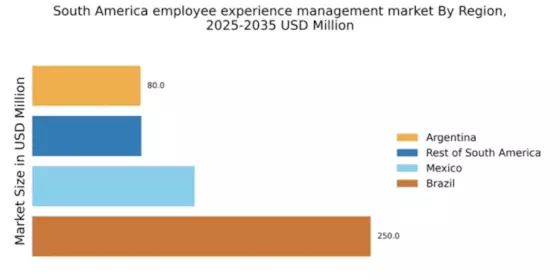Focus on Employee Feedback Mechanisms
The employee experience-management market in South America is evolving with a heightened focus on employee feedback mechanisms. Organizations are increasingly implementing tools and platforms that facilitate real-time feedback, enabling them to gauge employee sentiment and address concerns promptly. Recent studies indicate that companies utilizing feedback systems report a 30% improvement in employee engagement levels. This trend underscores the importance of open communication and responsiveness in enhancing the overall employee experience. As businesses strive to create a more inclusive and responsive workplace, the employee experience-management market is expected to expand, driven by the demand for effective feedback solutions.
Emphasis on Flexible Work Arrangements
In South America, the employee experience-management market is increasingly influenced by the emphasis on flexible work arrangements. Organizations are adapting to the evolving expectations of their workforce, with many employees seeking options such as remote work and flexible hours. Recent surveys indicate that around 70% of employees prefer jobs that offer flexibility, which has prompted companies to rethink their policies. This shift not only enhances employee satisfaction but also contributes to higher productivity levels. Consequently, the employee experience-management market is expected to grow as businesses implement strategies that accommodate diverse work preferences, thereby attracting and retaining top talent.
Integration of Data Analytics in HR Practices
The employee experience-management market in South America is being transformed by the integration of data analytics into human resources practices. Organizations are leveraging data to gain insights into employee behavior, preferences, and performance. This analytical approach allows companies to tailor their employee experience strategies more effectively. Recent findings suggest that organizations utilizing data analytics in HR report a 25% increase in employee retention rates. This trend indicates a shift towards data-driven decision-making, which is likely to enhance the overall employee experience. As businesses continue to adopt advanced analytics, the employee experience-management market is poised for growth, driven by the need for informed and strategic HR practices.
Rising Demand for Employee Well-being Programs
The employee experience-management market in South America is witnessing a notable increase in demand for well-being programs. Organizations are recognizing the importance of mental and physical health in enhancing employee satisfaction and productivity. According to recent data, approximately 65% of companies in the region are investing in wellness initiatives, which include mental health support, fitness programs, and work-life balance strategies. This trend indicates a shift towards a more holistic approach to employee management, where well-being is prioritized. As a result, the employee experience-management market is likely to expand, driven by the need for companies to create supportive environments that foster employee engagement and retention.
Investment in Employee Training and Development
The employee experience-management market in South America is significantly impacted by the growing investment in employee training and development. Companies are increasingly recognizing that continuous learning opportunities are essential for employee engagement and retention. Data suggests that organizations allocating at least 5% of their budgets to training programs experience a 20% increase in employee satisfaction. This trend reflects a commitment to fostering a culture of growth and development, which is crucial in a competitive job market. As businesses prioritize skill enhancement and career advancement, the employee experience-management market is likely to see substantial growth driven by these initiatives.

















